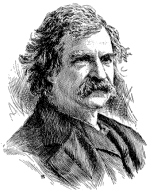The Boys’ Life of Mark Twain
by Paine

XXXII. At Work on “Roughing It”
The Clemens family now went to Elmira, to Quarry Farm–a beautiful hilltop place, overlooking the river and the town–the home of Mrs. Clemens’s sister, Mrs. Theodore Crane. They did not expect to return to Buffalo, and the house there was offered for sale. For them the sunlight had gone out of it.
Matters went better at Quarry Farm. The invalids gained strength; work on the book progressed. The Clemenses that year fell in love with the place that was to mean so much to them in the many summers to come.
Mark Twain was not altogether satisfied, however, with his writing. He was afraid it was not up to his literary standard. His spirits were at low ebb when his old first editor, Joe Goodman, came East and stopped off at Elmira. Clemens hurried him out to the farm, and, eagerly putting the chapters of “Roughing It” into his hands, asked him to read them. Goodman seated himself comfortably by a window, while the author went over to a table and pretended to write, but was really watching Goodman, who read page after page solemnly and with great deliberation. Presently Mark Twain could stand it no longer. He threw down his pen, exclaiming:
“I knew it! I knew it! I’ve been writing nothing but rot. You have sat there all this time reading without a smile–but I am not wholly to blame. I have been trying to write a funny book with dead people and sickness everywhere. Oh, Joe, I wish I could die myself!”
“Mark,” said Goodman, “I was reading critically, not for amusement, and so far as I have read, and can judge, this is one of the best things you have ever written. I have found it perfectly absorbing. You are doing a great book!”
That was enough. Clemens knew that Goodman never spoke idly of such matters. The author of “Roughing It” was a changed man–full of enthusiasm, eager to go on. He offered to pay Goodman a salary to stay and furnish inspiration. Goodman declined the salary, but remained for several weeks, and during long walks which the two friends took over the hills gave advice, recalled good material, and was a great help and comfort. In May, Clemens wrote to Bliss that he had twelve hundred manuscript pages of the new book written and was turning out from thirty to sixty-five per day. He was in high spirits. The family health had improved–once more prospects were bright. He even allowed Redpath to persuade him to lecture again during the coming season. Selling his share of the “Express” at a loss had left Mark Twain considerably in debt and lecture profits would furnish the quickest means of payment.
When the summer ended the Clemens family took up residence in Hartford, Connecticut, in the fine old Hooker house, on Forest Street. Hartford held many attractions for Mark Twain. His publishers were located there, also it was the home of a distinguished group of writers, and of the Rev. “Joe” Twichell. Neither Clemens nor his wife had felt that they could return to Buffalo. The home there was sold–its contents packed and shipped. They did not see it again.
His book finished, Mark Twain lectured pretty steadily that winter, often in the neighborhood of Boston, which was lecture headquarters. Mark Twain enjoyed Boston. In Redpath’s office one could often meet and “swap stories” with Josh Billings (Henry W. Shaw) and Petroleum V. Nasby (David R. Locke)–well-known humorists of that day–while in the strictly literary circle there were William Dean Howells, Thomas Bailey Aldrich, Bret Harte (who by this time had become famous and journeyed eastward), and others of their sort. They were all young and eager and merry, then, and they gathered at luncheons in snug corners and talked gaily far into the dimness of winter afternoons. Harte had been immediately accorded a high place in the Boston group. Mark Twain as a strictly literary man was still regarded rather doubtfully by members of the older set–the Brahmins, as they were called–but the young men already hailed him joyfully, reveling in the fine, fearless humor of his writing, his wonderful talk, his boundless humanity.
 Continue...
Continue...![[Buy at Amazon]](http://images.amazon.com/images/P/B0006AHKG6.01.MZZZZZZZ.jpg)